In the capital city of Roraima, Boa Vista, part of the gold illegally extracted from TI Yanomami circulates freely among dozens of jewelry stores. Rua do Ouro is a traditional center for these small businesses, where many miners go to sell the gold they have extracted. The atmosphere is not a friendly one and only a few customers roam the area. But it took just three days for the Amazonia Real reporters to witness the purchase and sale of illegal gold.
It was almost the end of business hours, on an April afternoon, when the reporters were invited into the Opalo store, on Avenida Benjamin Constant, by the shop assistant. The assistant, who did not know she was talking to journalists, invited the reporters in after confirming that the shop sold gold earrings. As soon as we stepped into the store, the door was locked and one of the owners, identified as Willians Suarez, brought in a black jewelry display from the back. He displayed the pieces on the counter and claimed that they were guaranteed and certified. Without a window or exposed jewelry, the interior of the establishment looks more like a humble office than a glitzy jewelry store.
While the reporters asked about price and payment methods, a man entered the shop and asked if the place was buying “gold from the mines”. The owner replied in the affirmative. It was not possible to tell if the man was a miner, a mine owner or a middleman. He arrived on a motorcycle, wearing denim shorts and sandals.
A few minutes later, while the reporters were still inside the store, a woman, wearing a protective mask with the logo of the Special Secretariat for Indigenous Health (Sesai), came in and asked the same question. The shopkeeper Suarez once again said “I’ll buy everything”. The door was still locked. We left the shop but continued to follow the action from the outside.
The woman, identified as physiotherapist Thatiana Almeida, didn’t even bother to park her car. She left the car running, with the headlights on, far from the curb while she went into the Opalo store. Moments later, she walked out of the jewelry store, took a package from the glove compartment, and went back inside. The reporters identified the employee of the Special Secretariat for Indigenous Health (Sesai), of the Ministry of Health, through the license plate of her car, a black Corolla, license plate NOY-1G90 registered in the name of a family member. The same car appears in a post on Thatiana’s social network on December 23, 2020.
On a social network, the physiotherapist informs that she has worked as a nurse at Sesai since 2016. In a post on April 12, she appears in photos vaccinating Yanomami children. One of the photos is captioned “15-day mission, I thank God for my successful work and continue to care and do my best for those who need the most, the indigenous people, the Yanomami people”.
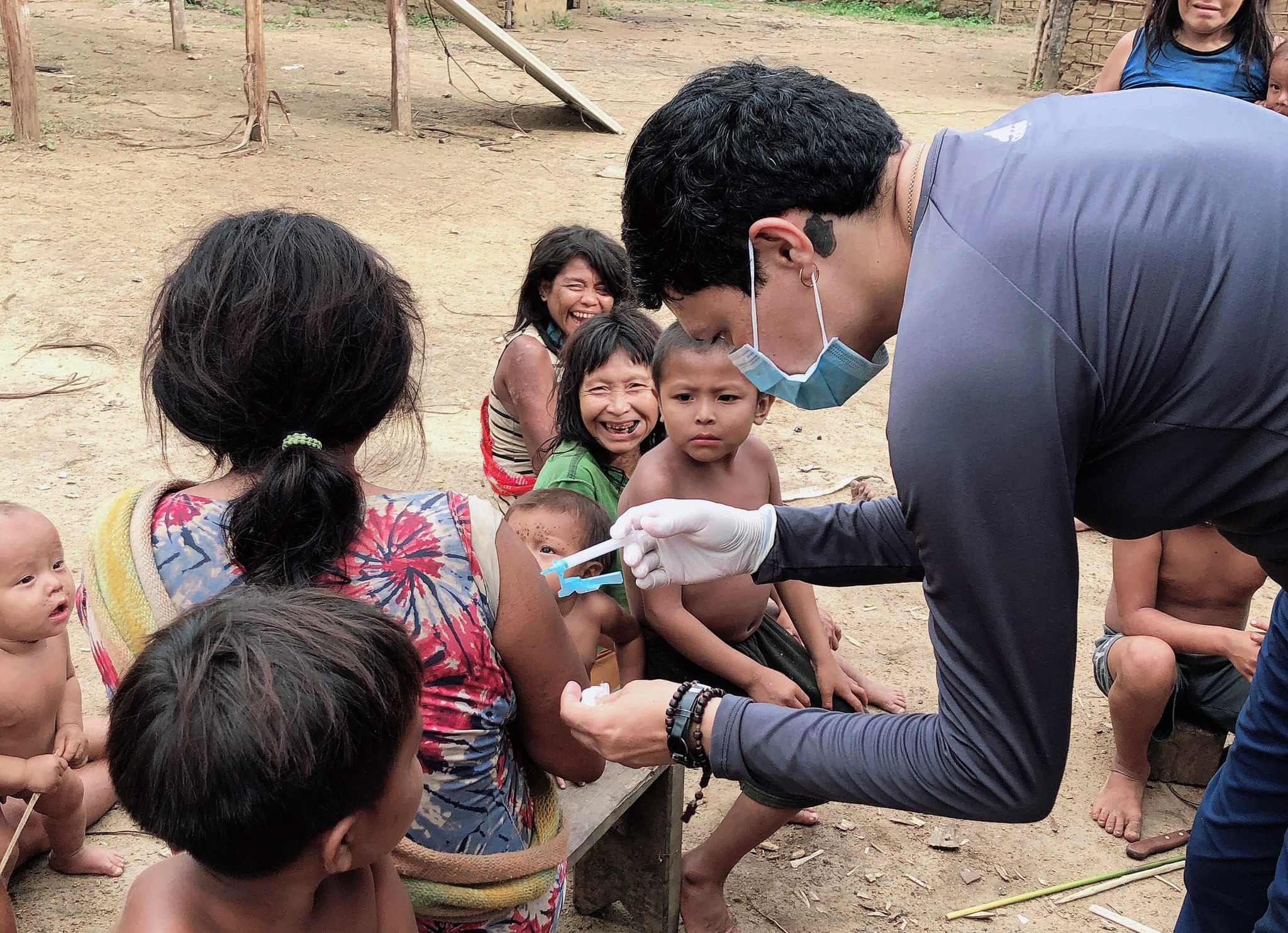
The exchange of vaccines for gold by Sesai employees has been the target of a complaint filed by the Hutukara Associação Yanomami to the Federal Public Prosecutors’ Office. In April, territory leaders reported that vaccine doses were being sold to miners in exchange for gold. The Mixed Parliamentary Front in Defense of Indigenous Peoples also reported the case to the Parliamentary Inquiry Commission (CPI) on Covid.
The reporters tried to talk to Thatiana Almeida by telephone and on the social network. Her phone went to voicemail during the three days the reporters tried to call her. After a private message was sent to her on the social network, she deleted her profile. The reporters also sent her a WhatsApp message, but got no answer.
The Ministry of Health informed, via its press office, that it will investigate the allegations and that it is available to the authorities to provide all necessary information.
Regarding the investigations into the exchange of vaccine for gold reported by the Hutukara Association, the Federal Public Prosecutors’ Office informed that the agency “sent an official letter to Dseis (Special Indigenous Sanitary District), held a meeting with the agencies involved and scheduled another meeting for June 28 to address these issues affecting the IT”.
Willians Suarez, of Opalo jewelry, was contacted by telephone, but could not be found. He also didn’t respond to messages sent to his social media profile.
The stores at Rua do Ouro
Rua do Ouro was established at the height of the gold rush, in the 1980s and 1990s, when there were more than 40,000 illegal miners working at the indigenous territory. Business boomed and the shops expanded to three other streets: Avenida Benjamin Constant, Rua Cecília Brasil and Rua Araújo Filho, all in downtown Boa Vista. The reporters counted 39 stores selling jewelry and buying gold at these addresses, but some do not have storefronts, which means that their owners cannot be identified through the Federal Revenue registry. Only 19 stores have active records (CNPJs) with the Federal Revenue Office. Of these, at least eight jewelry stores and 14 businessmen or employees were investigated by the Federal Police for direct involvement in the purchase of gold originating from illegal mines in Roraima.
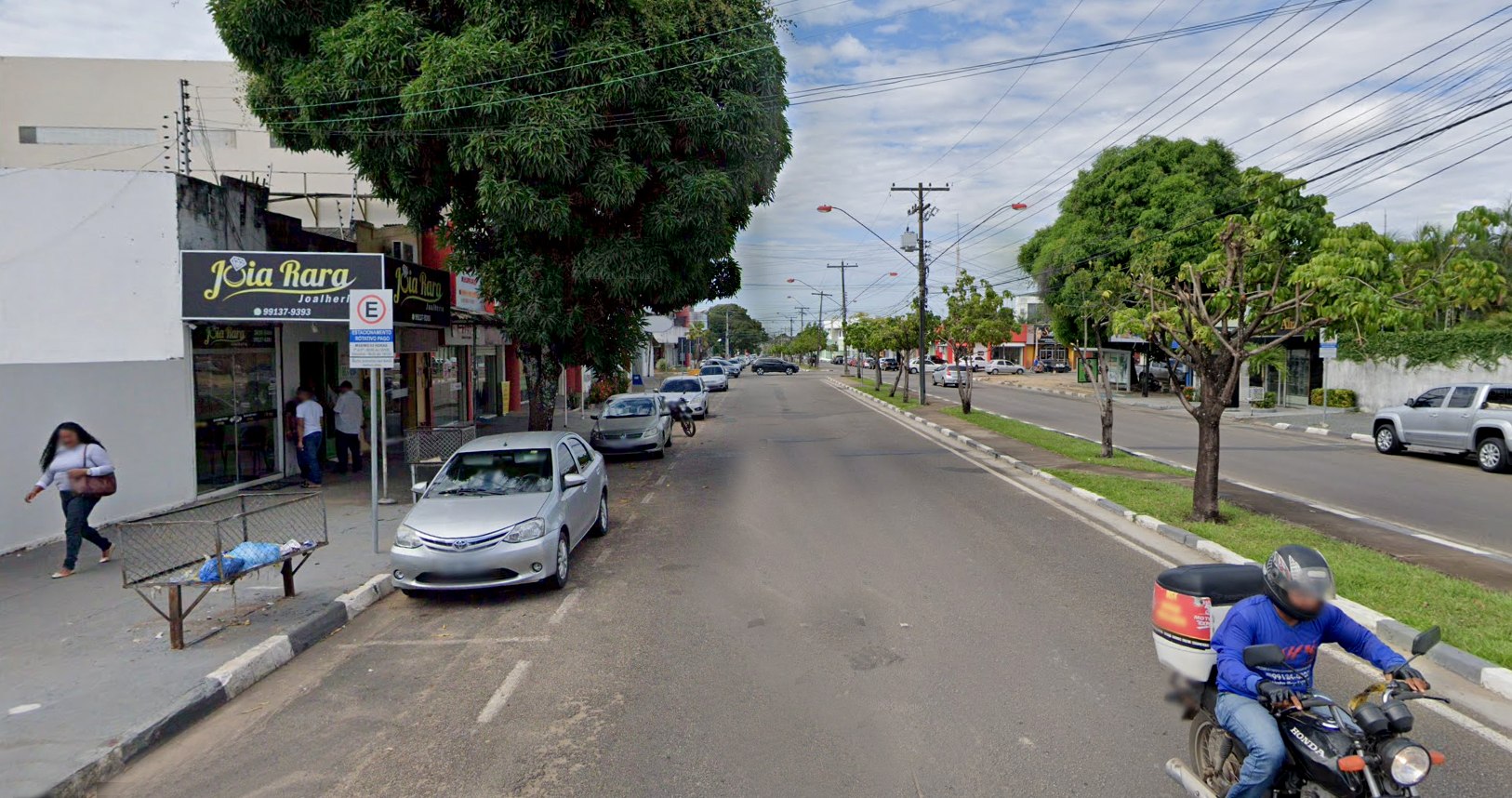
In 1989, Rua do Ouro was identified in an article on The New York Times as a hub for the trade of ore coming from the Yanomami indigenous territory. Today, the street still has the same rows of small stores, all jammed together, even though many shop owners have migrated their businesses to other less targeted areas of the city, such as Avenida Ataíde Teive and Avenida Solón Rodrigues Pessoa, a few kilometers away.
The shops at Rua do Ouro have been in the crosshairs of the Federal Police (PF) for years, as can be seen from the reports of the three main operations carried out against gold mining in Yanomami Land since 2012. During this period, the following jewelry stores were investigated and indicted: Du Ouro, Naza Joias, Gold Joias, Safira, Aliança, Guimarães Ouro, Ouro Mil and Princesse Joias.
The names leave no doubt, but from the modest signs on the storefronts in these and other shops that operate there – many hand-painted – an unsuspecting visitor might not even notice that there is a strong trade of gold and jewelry going on in the area. Today, there are practically no store windows with pieces on display and most stores seem to be closed. During business hours, there are almost always men, alone or in groups, guarding the entrances to the stores.
An ode to miners
Rua do Ouro emerged in a privileged location at downtown Boa Vista, a few meters away from the Civic Center (“Praça do Centro Cívico”), where Senador Hélio Campos Palace is located, the official seat of the state executive branch. Roraima is currently governed by Antonio Denarium (no-party), an ally to President Jair Bolsonaro.
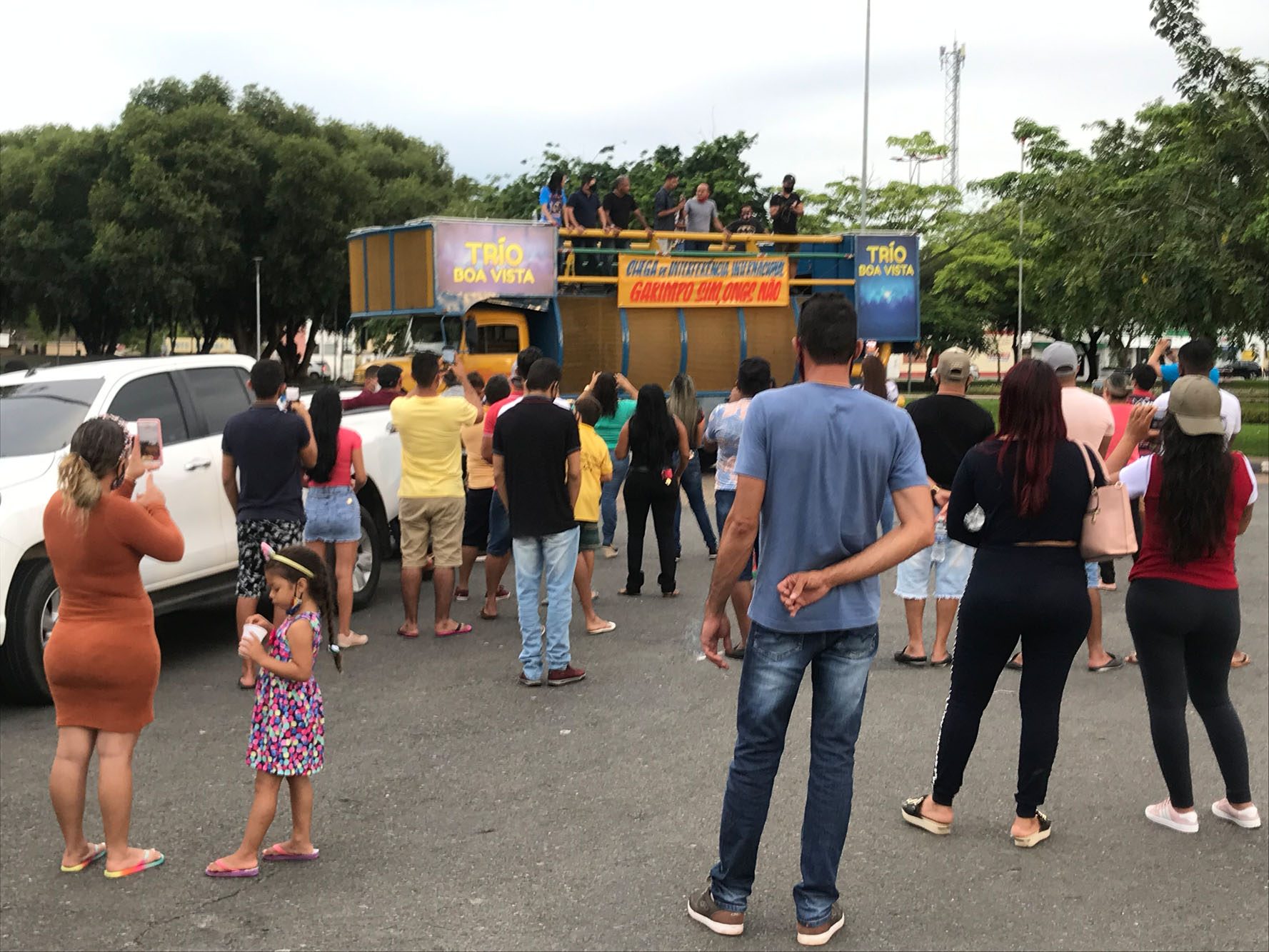
Right in the middle of Praça do Centro Cívico, the Monumento ao Garimpeiro (Monument to Miners) was built in the 1960s, a rubber mortar and aluminum statue more than seven meters tall, set on a reflecting pool. The sculpture shows a man using a gold pan, a container with a concave bottom used to wash sand that contains gold or diamonds and was commissioned by Hélio da Costa Campos, governor of the Federal Territory of Roraima between 1967 and 1969 and 1970 to 1974.
The statute was supposed to be a symbol of what the central government planned in terms of population densification in the region, which had been identified as very rich in ore, but lacking in labor to explore it. Before gold, diamond mining was explored in Roraima, on the border with Guyana, during the Getúlio Vargas administration.
It was in front of the Monument to Miners that, on April 27, 2021, days before the miners began a series of shooting attacks against indigenous people and public security agents at the Yanomami community of Perimiu, “mining entrepreneurs” took to the streets to defend the legalization of the activity.
From the top of a car and over a loudspeaker, protesters shouted that they were not afraid of inspectors or authorities and summoned others to rally at the headquarters of Ibama (Brazilian Institute for the Environment and Renewable Natural Resources) against the apprehensions of machinery. “We want the same respect as a drug dealer in Rio de Janeiro”, shouted one of the protesters over the car loudspeaker. They know that part of the population of Roraima supports the criminal activity of gold extraction in indigenous territories.
Ghost stores
Some establishments linked to the gold trade maintain active registrations with the Federal Revenue Office but are “non-existent” in real life; there is no store open to the public. They were mentioned in the reports of the Federal Police as sellers of Yanomami blood gold. The jeweler Gold Joias is part of this group and, after the Warari Koxi operation, it was charged with being part of a scheme to send illegal gold to Distribuidora de Títulos e Valores Mobiliários (DTVM) Ourominas, in São Paulo.
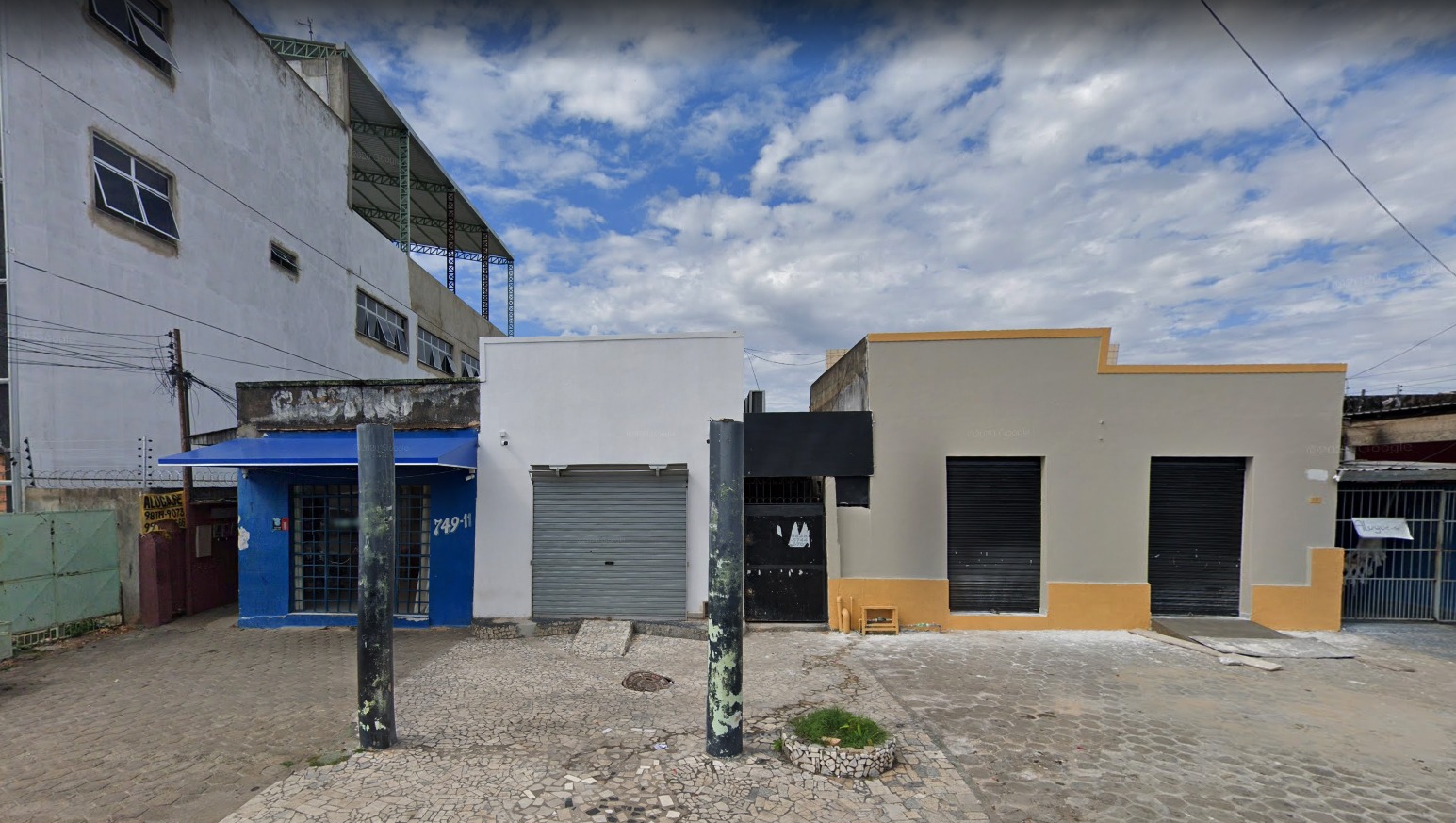
A goldsmith who has worked in jewelry stores at Rua do Ouro and its surroundings for more than a decade, and whose identity will be preserved, told the Amazônia Real reporters that in most stores the few pieces of jewelry on display in the rare store windows are just a disguise. The real business, the buying and selling of illegal gold, takes place in the back. There, the ore usually arrives raw, either as a powder or stone, and it is up to the goldsmith to transform the material into gold bars.
“But only 1% of the gold stays here. The gold leaves the mines with a predefined destination. What do miners and buyers do? They take the balance for the week or month, wrap it up and give the package to a pilot to bring into town. I’ve seen a lot of that, the pilot arrives with 10 small packets of gold, place them on my desk and say ‘These belong to so-and-so. Here is the list, the contacts, the people who will buy it and who will pay for it’”, said the goldsmith.
Intermediaries and middlemen
According to this source, most of the owners of jewelry stores involved in the illegal gold scheme are just a name on the paper, strawmen. The real owners are investors based in the South and Southeast regions of the country. He also said that there are buyers from abroad who arrive by plane or helicopter and go straight down to the mines, some with armed security guards, to buy gold directly from the source– and thus pay less . Others travel only to Boa Vista, where they have a network of intermediaries and jewelers.
When a businessman goes to the airstrip or sends someone to the mine, he buys the gold and sends it along the business path. But when the miners come to the city, they first sell to local businessmen, who then sell to others. And sometimes businessmen don’t want to go all the way to the airstrip, inside the mining area, because they think it’s too dangerous, so they come to Boa Vista.
In those cases, the gold owner makes contacts, entices goldsmiths, other businessmen, sets up a scheme to purchase gold and injects money. “So, what happens is that the jewelry store is just a front, that person is just a strawman, because the owner of the money is a big investor from a different place.”
In the crosshairs of the Federal Police
In another store at Rua do Ouro, Princesse, the owner of the place, Soraya Naim Sajim, said that it was very common for people to show up trying to sell gold from the mines. It is an almost daily occurrence, but she denied accepting this kind of transaction. Princesse has been a target of a Federal Police investigation for being in possession of diamonds without proof of origin. At the facility, 18 rough diamond stones were found on May 7, 2015, while the police carried out a search and seizure warrant.
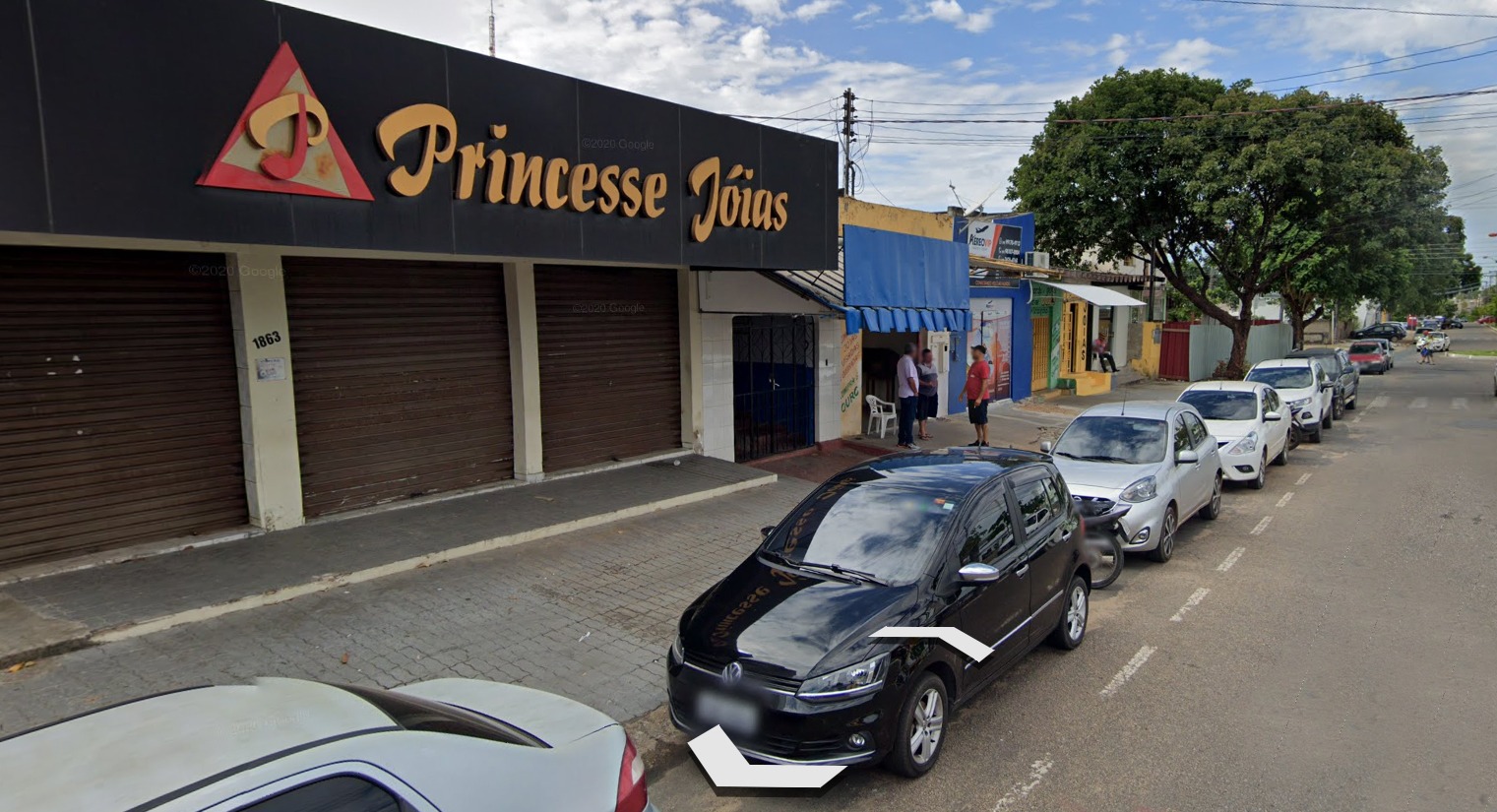
By phone, Soraya also told the reporters that the jewelry store only sells pieces manufactured in São Paulo and Minas Gerais. She also stated that the diamond found by the police “had been in the vault for many years. It had no commercial value. We were able to show this to them (the Federal Police). They were so-called industrial (stones), they cannot be cut”. “We never worked with anything illegal”.
At Joalheria Aliança, owned by Jackson Gomes Lima, who was also targeted by the Federal Police in 2015 for buying illegal gold from TI Yanomami, a sales assistant informed that all the jewelry pieces sold at the store are manufactured using scrap gold. In other words, those pieces are allegedly manufactured using gold from old pendants, necklaces and earrings that people no longer want.
Over the phone, Jackson Lima also denied buying gold from mines. “Here nobody buys from Yanomami mines. We work with scrap. We use products purchased from auctions carried out by Caixa [Econômica Federal]. I don’t know why our store was mentioned by the PF”, he told the reporters.
Seven stores at Rua do Ouro and the surrounding area form a network linked to a single family: the Venâncio family, who come from the municipality of Pauini, in Amazonas.
One of the businessman is José Raimundo de Castro Venâncio, owner of the Ouro Mil jewelry store. He was investigated by the Federal Police in 2015 in operation Warari Koxi, which targeted jewelry stores and DTVMs involved in the purchase and sale of illegal gold from TI Yanomami. DTVMs are financial companies authorized by the Central Bank to sell gold. They are located at Avenida Paulista, in the capital of São Paulo. In the course of the investigation, he testified and confirmed that he had bought gold from the mines and had done business with DTVM Ourominas from 1988 to 1990. For two days, the reporters tried to contact Ouro Mil through the telephone number registered with the Federal Revenue Office, but the calls went unanswered.
Read about the role of DTVMs in the sale of illegal gold
In May 2015, the Federal Police seized 22 grams of raw gold mined in indigenous land at Ouro Mil. The company is the oldest in the family and was registered with the Federal Revenue Office in 1990. In 2004, Venâncio failed in his attempt to be elected city councilman in Boa Vista, representing the PPS party. Curiously enough, when rendering accounts to the Electoral Courts, the gold trader did not declare any assets.
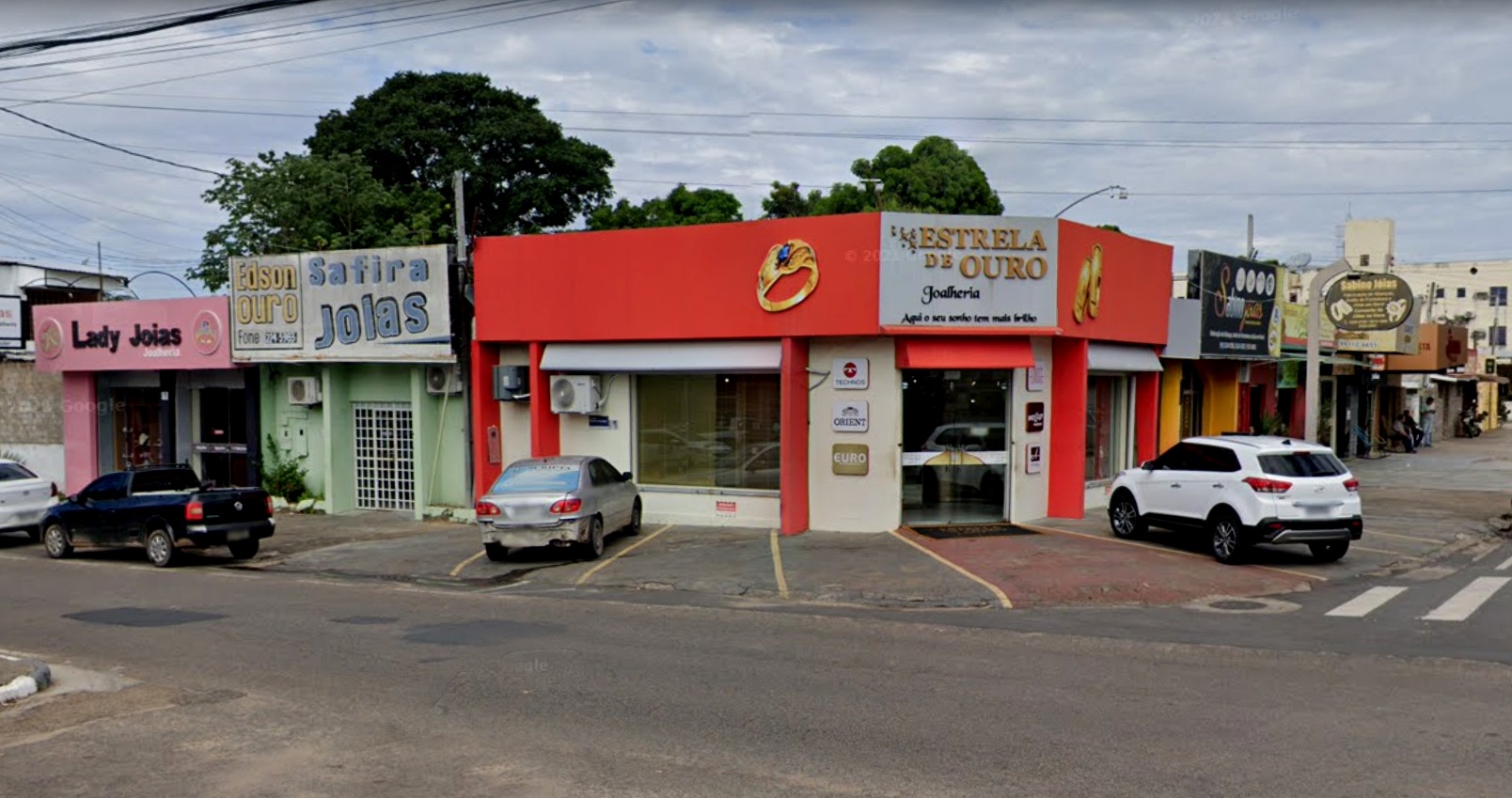
Another point that stands out are the constant changes in the storefronts and addresses of stores in the Rua do Ouro region. Safira Joias, which was implicated in operations Xawara and Warari Koxi, still has an active registration with the Federal Revenue Office, but its storefront currently shows a different name: “Caraúbas Joias”. The reporters did not identify a CNPJ registration number for this establishment with the Revenue Office, or through internet searches. Safira Joias is also implicated in the investigation of operation Tori, launched in 2017.
That year, a Federal Police report pointed out the information that one of the jewelers’ partners at the time, in addition to buying illegal gold from TI Yanomami, also lent money to at least three aircraft owners to buy supplies for miners who were working in the field. The list of orders made by the miners was transmitted by radio to an illegal center in Boa Vista, where purchases were made and then shipped out to them. In these negotiations, the money lent by the businessman to the aircraft owners was deducted from future freight costs relating to the transportation of gold, according to police. The report tried to contact Safira by phone through the number registered with the Federal Revenue Office, but the calls went unanswered.
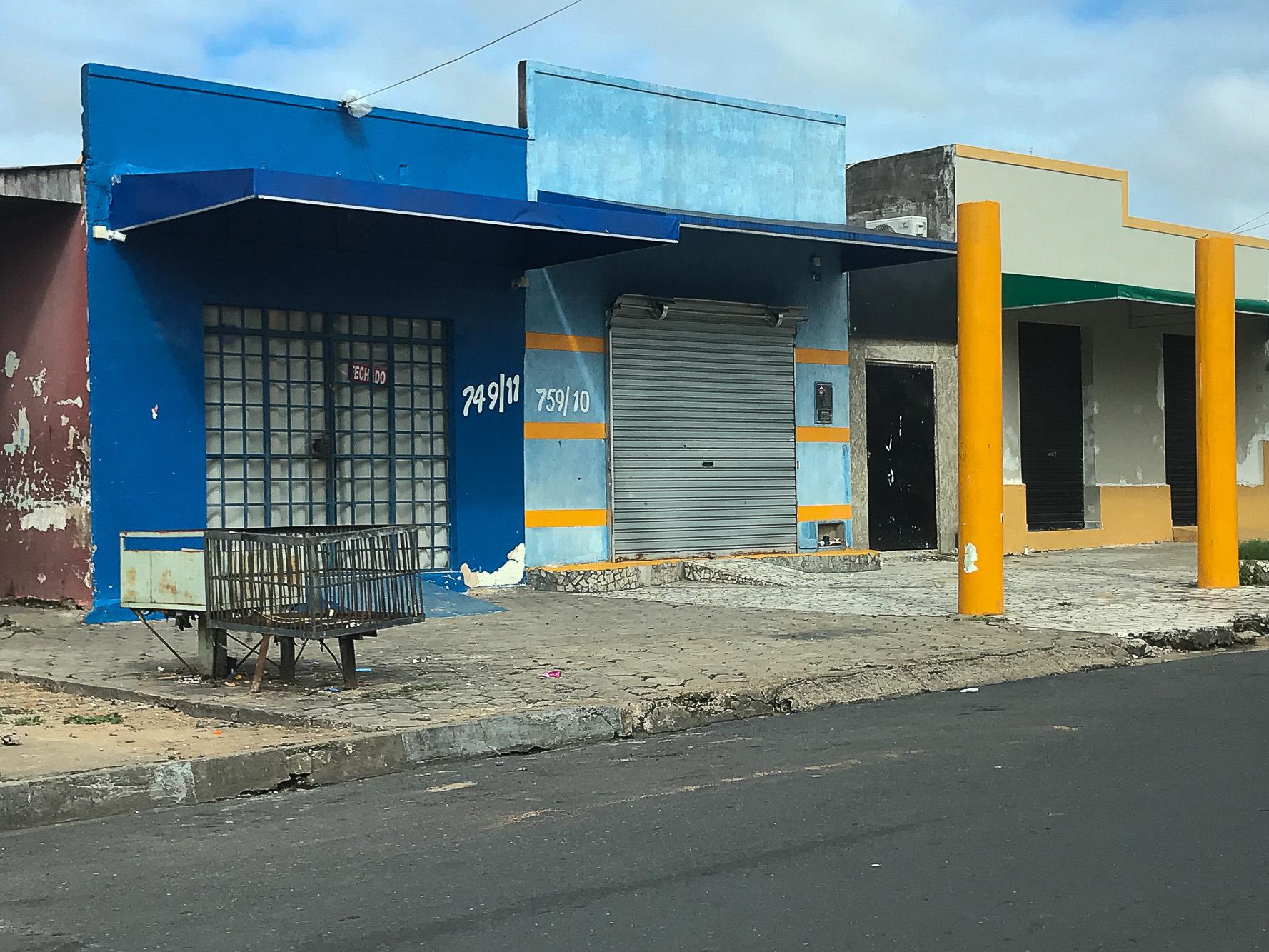
Yanomami Blood Gold Teams
Amazônia Real: Kátia Brasil (executive editor); Eduardo Nunomura (special editor); Alberto Cesar Araujo (photography editor), Elaíze Farias (content editor); Maria Fernanda Ribeiro, Clara Britto and Alicia Lobato (reporters); Bruno Kelly (flight photographer) and Paulo Dessana (photographer); Lívia Lemos (social media); Maria Cecília Costa (executive assistant); Giovanny Vera (maps); César Nogueira (editing); Nelson Mota (developer); and Ana Cecilia Maranhão Godoy (translator).
Repórter Brasil: Ana Magalhães (journalism coordinator); Mariana Della Barba (editor); Mayra Sartorato (social media editor); Piero Locatelli and Guilherme Henrique (reporters); Joyce Cardoso (intern).


